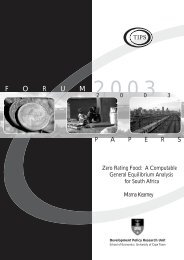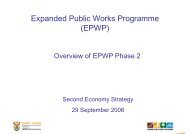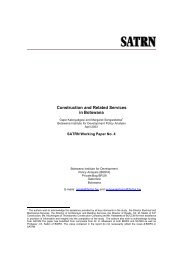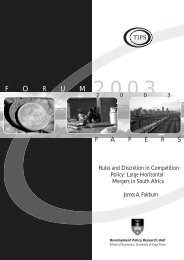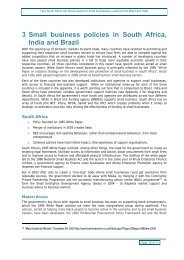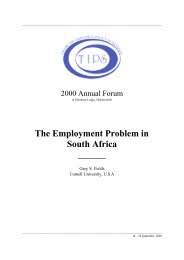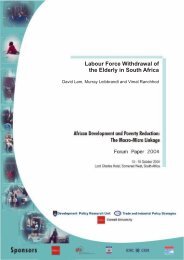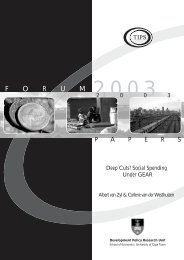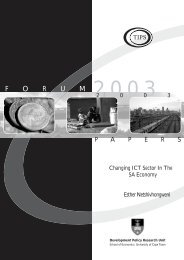(AsgiSA) Annual Report 2008 - South African Government Information
(AsgiSA) Annual Report 2008 - South African Government Information
(AsgiSA) Annual Report 2008 - South African Government Information
You also want an ePaper? Increase the reach of your titles
YUMPU automatically turns print PDFs into web optimized ePapers that Google loves.
Accelerated and Shared Growth Initiative for <strong>South</strong> Africa<br />
ANNUAL REPORT<br />
<strong>2008</strong><br />
result of the financial market turmoil and the sharp decrease in commodity prices. In November and<br />
December <strong>2008</strong>, inflation declined to 12,1% and 10,3%, respectively. The official inflation rate (i.e. the<br />
percentage change in the CPI for all urban areas at January 2009 compared with that at January <strong>2008</strong>)<br />
was 8,1% at January 2009. It should be noted that in October <strong>2008</strong>, the Minister of Finance announced<br />
that the new headline consumer price index (CPI) for all urban areas would become the new inflation<br />
target measure replacing the CPIX.<br />
The global economic crisis started to impact on the economy in <strong>2008</strong>, resulting in declining economic<br />
growth recorded in the last quarter. The global crisis was preceded by a sharp tightening in domestic<br />
interest rates to counteract rising inflation, resulting in a double blow to growth.<br />
Despite the monetary tightening, the rate of investment rose sharply with real fixed investment growing<br />
at an annual rate of 10% in the third quarter of <strong>2008</strong> and investment reaching 24% of GDP. The<br />
<strong>AsgiSA</strong> investment rate target was virtually achieved five years early. While private-sector investment<br />
continues to grow but at a much slower pace, the growth in investment spending is mainly due to increased<br />
capital expenditure by public corporations and general government.<br />
The deficit of the current account on the balance of payments remains the Achilles’ heel of the <strong>South</strong><br />
<strong>African</strong> economy. By 2004, when the economy’s growth rate exceeded 4% per annum, the current<br />
account moved into deficit. Largely as a result of the low interest rate environment since 2003, the rapid<br />
growth in government expenditure and an overvalued exchange rate, the surge in demand resulted in<br />
growing demand for imported goods and imported capital goods as firms expanded their production<br />
capacity and government accelerated its investment in necessary infrastructure. While exports as a<br />
percentage of GDP grew from 21% in 1994 to over 30% in 2006, growth in imports outstripped the<br />
growth in exports.<br />
The deficit on the current account of the payments balance, however, was comfortably financed as long<br />
as foreign investors were attracted to <strong>South</strong> Africa – with a substantial increase of foreign capital entering<br />
<strong>South</strong> Africa up to <strong>2008</strong>. Most of the foreign investment has, however, been in the form of portfolio<br />
investments, mainly on the JSE Securities Exchange and in <strong>South</strong> <strong>African</strong> government bonds. Given<br />
current global economic conditions and turmoil in global financial markets, financing of the deficit is of<br />
concern and could negatively impact growth going forward.<br />
What has been learnt in the recent period is that a pro-cyclical fiscal policy along with an overvalued<br />
currency was a recipe for overheating – the <strong>South</strong> <strong>African</strong> economy would have been forced to cut back<br />
in the current period even without the global slowdown. In the next round of growth, government<br />
might prefer to try to balance the macroeconomic variables more carefully to avoid premature overheating<br />
and a stop-start growth pattern.<br />
7



